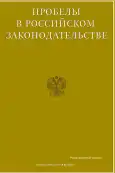Эволюция подходов к определению принципов права и правотворчества: теория и политико-правовая практика
- Авторы: Зубов В.В.1
-
Учреждения:
- Финансовый университет
- Выпуск: Том 16, № 3 (2023)
- Страницы: 27-36
- Раздел: Теоретико-исторические правовые науки
- URL: https://journals.eco-vector.com/2072-3164/article/view/568776
- EDN: https://elibrary.ru/BHTVKX
- ID: 568776
Цитировать
Аннотация
В предложенной публикации проводится комплексное рассмотрение исторического пути изменения подходов (теоретических и практических) к определению принципов права и правотворчества и устанавливается характер эволюционного процесса в политико-правовой материи. На основе всеобщего диалектического метода, анализа и сравнительно-правового подхода обозначаются и раскрываются принципы права и правотворчества в зависимости как от уровня и степени обобщенности (специальные, отраслевые, межотраслевые, всеобщие), так и от специфики текущего или исторического этапа развития политико-правовой действительности, устанавливается содержание понятия «правотворчество» в непосредственной связи с близкими категориями, характеризуется правотворческий процесс и виды правотворчества. По ходу изложения материала автор устанавливает, что актуальное российское право строится на синтезе достижений основных концепций правопонимания – естественноправовой доктрины, позитивизма и реалистической школы права. Обозначается, что в течение последних лет принципы права в России эволюционируют на фоне неуклонной суверенизации отечественного политического и правового порядка. Дается определение правотворчества как целенаправленной деятельности компетентных органов по изменению, установлению или отмене правовых норм, являющейся высшей формой выражения процесса правообразования и составным элементом нормотворчества, устанавливается, что принципы правотворчества должны коррелировать с актуальными принципами права. В заключении статьи делается вывод о том, что эволюция принципов права и правотворчества носит нелинейный характер, она варьируется в зависимости от уровня развития каждого отдельного правопорядка и индивидуальных особенностей становления, функционирования и развития социума. На примере отечественного правопорядка автор показывает, что рецепция западноевропейских принципов права по мере укрепления независимости Российской Федерации на международной арене сменилась построением национального законодательства с учетом особого исторического пути страны и тех традиционных фундаментальных ценностей, которые имманентны единому многонациональному народу России.
Ключевые слова
Полный текст
Об авторах
Вадим Владиславович Зубов
Финансовый университет
Автор, ответственный за переписку.
Email: zubov305@yandex.ru
ORCID iD: 0000-0001-6446-3221
канд. ист. наук, доцент Департамента политологии
Россия, МоскваСписок литературы
- Конституция Российской Федерации // Собрание законодательства Российской Федерации. 2014. №31. Ст.4398.
- Гражданский кодекс Российской Федерации. Часть первая // Собрание законодательства Российской Федерации. 1994. №32. Ст. 3301.
- Уголовный кодекс Российской Федерации // Собрание законодательства Российской Федерации. 1996. №25. Ст. 2954.
- Кодекс Российской Федерации об административных правонарушениях // Собрание законодательства Российской Федерации. 2002. №1. Ст.1.
- Арбитражный процессуальный кодекс Российской Федерации // Собрание законодательства Российской Федерации. 2002. №30. Ст. 3012.
- Захарова К.С. Системные связи принципов права: теоретические проблемы: Дисс. канд. юрид. наук:12.00.01/ Саратовская государственная академия права. Саратов, 2009. 255 с.
- Кайтаева Х.И. Правотворчество в правовом государстве: Дисс. канд. юрид. наук:12.00.01/ Московский университет МВД РФ. М., 2006. 178 с.
- Сидоркин А.С. Принципы права: понятие и реализация в российском законодательстве и судебной практике: Дисс. канд. юрид. наук:12.00.01/ Российский университет дружбы народов. М., 2010. 206 с.
- Чечельницкий И.В. Справедливость в правотворчестве: теоретико-правовое исследование: Дисс. канд. юрид. наук:12.00.01/ Российский университет дружбы народов. М., 2014. 286 с.
- Гегель Г.В.Ф. Наука логики. В трех томах. Том 2. М.: «Мысль», 1971. 248 с.
- Гоббс Т. Левиафан. М.: РИПОЛ классик, 2016. 672 с.
- Кельзен Г. Чистое учение о праве. СПб.: ООО Издательский Дом «Алеф-Пресс», 2015. 542 с.
- Локк Дж. Сочинения в трех томах. Том 3. М.: «Мысль», 1988. 668 с.
- Ницше Ф. О власти. М.: Издательство АСТ, 2018. 432 с.
- Руссо Ж.-Ж. Политические сочинения. СПб.: Росток, 2013. 640 с.
- Мандрикова Е.А. Разумность в системе требований к нормотворчеству // Национальный университет «Юридическая академия Украины имени Ярослава Мудрого». 2013. №123. С.196-203.
- Филиппов А.Р. Аксиоматический метод познания природы прав человека // Пробелы в российском законодательстве. 2017. №3. С. 318-322.
- Цыбулевская О.И., Касаева Т.В. Социальные факторы правообразования // Юридическая техника. 2012. №6. С. 608-612.
- Указ Президента РФ от 9 ноября 2022 г. № 809 «Об утверждении Основ государственной политики по сохранению и укреплению традиционных российских духовно-нравственных ценностей» [Электронный ресурс]. URL: http://publication.pravo.gov.ru/Document/View/0001202211090019 (Дата обращения: 25.03.2023).
Дополнительные файлы









